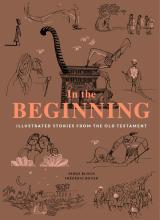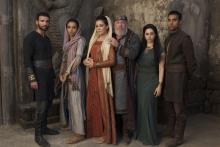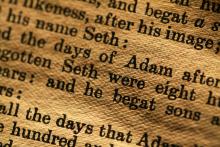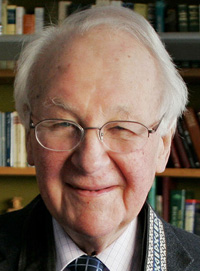old testament

These faithful Christians may not realize that they have inherited the long historical lineage of Christianity that, since the early centuries of the common era, has partaken in a deliberate or unwitting de-Judaizing of Christianity. The distancing from its original Jewish leadership, the replacement of Passover with Easter, the changing of names: Yeshua to Jesus, Miriam to Mary, Saul to Paul, continue to this day, despite Christian scholarship, altruism, and the progressive ideal of honoring a diversity of cultures.

IT HAS BEEN A TIME of shadows and warnings, bursts of violence and the creeping stain of betrayal. Falsehoods, at first a dripping faucet over a tin bucket—the hint of failing seals and valves, the promise of future corrosion—have become a downpour. Disintegration seems the rule.
Where to find a true story, one that endures?
Scripture might seem the logical turn for a Christian. But I know my weaknesses. Left to my own devices, I cherry-pick favorite verses, I swerve away from difficult passages. I rarely read anything in the Old Testament except the prophets—and those while too often presuming I stand with them, already on their side, and God’s: Nothing for me to hear, except the echo of the woe and correction I’d like to dole out to others. A situational loss of hearing that is a sure path to perdition.
But then I was introduced to an unusual portal to the holy word, one that easily charmed its way past my conscious and unconscious scriptural biases: a 500-plus-page coffee-table book whose bronze cover is adorned with line drawings of people who are at turns winsome and ominous. With title and highlights in fluorescent orange, the design is reminiscent of some DayGlo-kissed whimsy from the 1960s. In the Beginning: Illustrated Stories from the Old Testament (Chronicle Books) retells, through images and spare prose that is both fresh and respectful of the scriptural sources, core stories of the Judeo-Christian tradition, from creation and the Garden of Eden to Daniel in the lions’ den.

According to several sources, the number 40 is used almost 150 times in the Old and New Testaments. Some examples: Jesus was tempted in the wilderness for 40 days and 40 nights. There were 40 years of wilderness-wandering for the Jewish people fleeing bondage in Egypt. Noah and his family were in the ark for 40 days and 40 nights of the flood. There were 40 days and 40 nights of fasting while Moses was on Mount Sinai. Jonah was given 40 days to convert the people of Nineveh. Saul, David, and Solomon reigned 40 years each.

All was apparently going fine until Micha Brumlik, a retired Frankfurt University education professor and respected Jewish commentator, wrote last June that the popular toy was “anti-Jewish, if not even anti-Semitic.”
The problem, he said, was the inscription on the open pages of the Bible that the Playmobil Luther holds. On the left is written in German: “Books of the Old Testament. END,” while the right page says “The New Testament, translated by Doctor Martin Luther.”

And it's an Old Testament law.
Bob Lonsberry of WHAM 1180 AM radio asked the Republican front-runner, "Is there a favorite Bible verse or Bible story that has informed your thinking or your character through life?"

The Jewish people were nearing the end of their 40 years wandering through the desert when Moses orchestrated a census to determine how the promised land would be divided among families when they arrived. Mahlah, Noah, Hoglah, Milcah, and Tirzah were five sisters. The fact that they are often referred to as the “daughters of Zelophehad” or the “daughters of Z” reflects the patriarchy of the day (in which, for instance, land was only passed to a male heir). “Z” had died in the desert, and these women of the wilderness advocated for themselves with Moses.

Seger, who said she has seen only trailers of the series, says there can still be a market for such shows among Christians, like herself, or Jews.
“A Christian audience can get hooked on exactly the same things that any other audience does: violence, blood, sex, etc.,” she said. “As Christians, we might want to be high-minded and enlightened but that doesn’t mean we are.”

THE MORE I READ the story of Jonah nestled among the serious Minor Prophets of the Old Testament, the more fantastic and hilarious it gets. Everything is turned upside-down.
Jonah’s story follows Amos, who rips into rich people who “lie on beds of ivory and lounge on their couches.” It precedes Micah, whose Lord calls us “to do justice and to love kindness.” But Jonah spends his energy running away from Yahweh. In fact, Jonah is never even called a prophet in the book that bears his name. His interests and concerns are completely different from the Deity who has called him. Only entombment inside a “great fish” will drive his bedraggled, stinking self to the city that needs to repent. Even so, Jonah will perceive his surprising success as an utter failure.
But that’s getting ahead of the story. Most Hebrew prophetic books are collections of oracles unmoored to narrative, but Jonah’s tale has a setting, characters, and a plot! If you didn’t learn this in children’s Sunday school, here are the bare bones of the action:
Yahweh tells a man named Jonah to go east to the city of Nineveh to cry out against its evil. But Jonah flees in the opposite direction on a ship traveling west. A huge storm blows in, so when Jonah says it’s his fault, the sailors reluctantly throw him overboard. The storm immediately stops. A “great fish” swallows Jonah for three days and nights. Then God makes the fish vomit Jonah out on dry land.
In part two, Yahweh repeats his original imperative: Go to Nineveh and warn them of destruction. Jonah does so, expecting a fireball from heaven to burn the city to the ground. Instead, the king repents of his evil and asks all his subjects, as well as the animals, to demonstrate repentance by wearing sackcloth. So God changes God’s mind and does not destroy Nineveh. Jonah is angry because the Ninevites do not get what they deserve. He sulks under a bush God creates for him. The ensuing conversation underlines Jonah’s resistance to the merciful and loving character of Yahweh. The ending is ambiguous.

After this week’s botched execution in Oklahoma, Albert Mohler, president of The Southern Baptist Theological Seminary, argued why Christians should support the death penalty at CNN.com. Grounding his argument in Genesis 9:6, where Noah is told that anyone guilty of intentional murder should be put to death, Mohler says, “The one who intentionally takes life by murder forfeits the right to his own life.”
In my experience, most Christian pro-death penalty advocates make similar arguments, rooting themselves in Old Testament teaching. On occasion, they bolster their thinking with a somewhat cryptic reference to the government’s ability to “bear the sword” to “bring punishment on the wrongdoer” by the Apostle Paul. Rarely, will anyone cite Jesus’ teachings.
Mohler is a capable theologian and a thinker I respect. And I have many intelligent friends who support the death penalty. Yet, I think it is problematic for Christians to root their support of capital punishment in the Jewish Scriptures.


“I knew from the beginning that as a woman, an older woman, in a group of ministers who are accustomed to having women largely as supporters, there was no place for me to come into a leadership role. The competition wasn’t worth it.”
These are the words Ella Baker spoke regarding her decision to leave the Southern Christian Leadership Conference, SCLC, in 1958. Baker was one of the core founders of this organization. Yet, her male colleagues only recognized her competence and expertise to a limit. The “preacher’s club” selected Rev. Wyatt Tee Walker to replace Baker at the helm. Due to this prevailing patriarchy and what she deemed a focus on “mass rallies and grand exhortations by ministers without follow-up,” Baker left the SCLC. She chose to go her own womanly way.
We make decisions every day. Life’s twenty-four-hour cycle is filled with choices. We contemplate what we will wear. We ponder breakfast selections. Will it be the bagel with cream cheese or a caramel macchiato with soy? Should I watch Mad Men, Scandal, or go to bed early? Do I call or just send a text or email? Our daily lives are replete with routine choices.
However, beyond these commonplace decisions are those personal, communal, and national selections that will have an impact on our lives years from now.

We have learned from the crisis at Penn State University and other incidents that have gained national attention that it is not only religious authorities that turn a blind eye to abuses of power. The educational, legal, social service, and policing systems are broken when it comes to protecting children, and others who are vulnerable, from abuse.
Lest we forget our history and think that this is a uniquely 20th and 21st century problem, we need only turn to the Bible. In II Samuel, we are reminded that abuses of power, lust, and rage have always been part of the human experience.
An incident described II Samuel happens not in a religious or educational institution but in a family. It is not an isolated incident; it does not develop out of thin air. It is a case of “like father, like son.” Amnon’s father is King David, who in II Samuel 11, sees Bathsheba bathing and uses his power to have her brought to him so that he may “lay” with her.
It is only two chapters later that we read that Amnon, David’s son, is tormented by the beauty of his half-sister, Tamar. Amnon does not have the authority that his father David has, so he must use trickery instead of sheer power to get what he wants. After Amnon violently “lays” with Tamar, he is filled with hatred for her and forces her to leave his sight. In doing this, he shames her even further.
The scandal is not just that Amnon violates Tamar and the law of Israel, but when Tamar cries and ritually mourns her pain and disgrace she is told to be quiet. Her brother Absalom tells her to stop brooding over the episode. And while Absalom and their father, King David, are angry with Amnon for what he has done to Tamar, neither David nor Absalom even talks to Amnon about it. David does not punish his beloved firstborn son.
Perhaps one positive thing we can say about this story is that Tamar has a name; she is not anonymous like so many other powerless women in biblical stories. Tamar is named and remembered.
DREAMS CAN serve a powerful purpose. Jacob dreamed a ladder and was renamed Israel. Joseph dreamed the sun and moon and stars and was sold into slavery. The magi dreamed a warning and returned home by way of another road.
Years ago I had a dream. I sat, a child, on a dirt floor. Around me paced a horse, saddled, ready. In front stood an immense door, cathedral-tall and brooding. And though open, the space within was dark. I was holding a light. And in the dream, I knew we were to bring light into that darkness. And the darkness—the darkness was the church.
In Truth Speaks to Power: The Countercultural Nature of Scripture, Walter Brueggemann, professor emeritus of Old Testament at Columbia Theological Seminary, bears light to the exegetical (seminary lingo for interpretive) work and examination of the interplay between truth and power found in both familiar and less familiar narratives of Old Testament scripture. Rigorous in content, the read is nevertheless accessible to scholar and novice alike.
Brueggemann's concern with the interplay of truth and power rests on the observation that far too often truth, even biblical truth, is found colluding with and legitimizing the self-serving and self-preserving agenda of totalistic and monopolizing authorities. To use biblical imagery, truth sides with the Pharaohs and the Solomons of the world and not with those on its margins and periphery.
The first two chapters draw on Brueggemann's impressive scholarship of Old Testament text and narrative to paint a disconcerting picture where not only are the bad guys truly bad, the good guys aren't any better. Take Joseph, the Technicolor-dreamer-slave become all-powerful-vizier (think prime minister) of Egypt. It is Joseph's land acquisition scheme, strategically implemented amid drought and famine, that results in Pharaoh controlling most of Egypt's wealth. It is Joseph who creates a permanent peasant underclass—the very class that will cry out for liberation from the injustice of having to bake bricks with no straw. And Solomon—well, you know something's gone terribly amiss when your empire accumulates "six hundred sixty-six talents of gold" (1 Kings 10:14) each year. If you don't see the editorial subtext, write it out numerically. Ouch!

Ten books on the shelf of one of our most respected biblical scholars.
 [Editors' note: Rev. John Stott, one of the world's most influential evangelical figures over the past half-century, died this Wednesday at age 90. Rev. Stott served as a contributing editor for Sojourners magazine, when we were known as The Post American, and wrote this article for the November/December, 1973 issue of the magazine. We will always remember Rev. Stott for his profound contributions to our community and the Church.]
[Editors' note: Rev. John Stott, one of the world's most influential evangelical figures over the past half-century, died this Wednesday at age 90. Rev. Stott served as a contributing editor for Sojourners magazine, when we were known as The Post American, and wrote this article for the November/December, 1973 issue of the magazine. We will always remember Rev. Stott for his profound contributions to our community and the Church.]
It seems to be a characteristic of the Anglo-Saxon mind to enjoy inhabiting the "polar regions" of truth. If we could straddle both poles simultaneously, we would exhibit a healthy balance. Instead, we tend to "polarize". We push some of our brothers to one pole, while keeping the other as our own preserve.
What I am thinking of now is not so much questions of theology as questions of temperament, and in particular the tension between the "conservative" and the "radical."
"Really? Gandhi's in hell? And we have confirmation of this?"